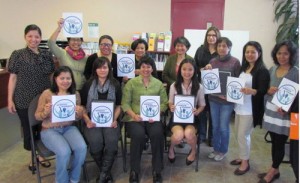First Int’l Domestic Workers Day marked
First Int’l Domestic Workers Day marked

Happy International Domestic Workers’ Day! Friends and Advocates of domestic workers from Migrante BC, West Coast Domestic Workers Association, Multicultural Helping House, El Shaddai, Canada Philippines Solidarity for Human Rights, UNITE, BC Nurses Union, with MLA Mable Elmore and Maita Santiago. “Domestic work is work!”
VANCOUVER, BC–It was exactly one year ago that the International Labour Organization adopted the Convention on Domestic Workers, formally known as the Convention Concerning Decent Work for Domestic Workers. This set of international standards recognizes domestic work as work and declares that domestic workers have equal rights and recognition as other workers which include the right to freedom of association and collective bargaining; the right to a minimum wage; the right to have at least one day off per week and reasonable hours of work; the right to clear information on terms and conditions of employment. In essence, the Convention recognizes domestic work as any other work and ensures that domestic workers are treated as any other worker under labour legislation.
Migrante BC joined the community reception to celebrate the First International Domestic Workers Day hosted by Mable Elmore, MLA for Vancouver Kensington. Beth Dollaga, Migrante’s delegate to the 2011 ILO Convention that passed the Convention on Domestic Workers spoke on the importance of the Convention.
At the reception were also other representatives and members from the West Coast Domestic Workers Association, the El Shaddai faith-based movement, We Care Live-in Caregiver Group, BC Nurses Union, UNITE, Tulayan, Migrante Youth, and the Canada Philippines Solidarity for Human Rights.
Ai Li Lim, Executive Director and staff lawyer of the West Coast Domestic Workers Association, declared that the Domestic Workers Convention is a “watershed day” for groups and communities which advocate for the protection of caregivers’ rights. “The fight is not over,” Ai Li Lim continued and reminded that everyone should urge Prime Minister Harper to sign the Convention and have it ratified by the Canadian government. The Canadian Live-in Caregiver Program which is another stream under the Temporary Foreign Workers (TFW) Program continues to be dominated by women from the Philippines. In 2010, 2,884 new immigrants arrived in BC through the Live-in Caregiver Program.
“Canada is bringing in more and more workers on temporary work permits, rather than permanent residents, a shift from permanent residency to temporary migration,” Jane Ordinario said when she introduced Migrante BC’s campaign on the promotion and protection of the rights of temporary foreign workers, a campaign in recognition of the vulnerable situation of many TFWs.
Ordinario introduced the Filipino Action Network (FAN) composed of Filipino organizations and advocates which will create a stronger voice in collectively addressing the immediate needs of Filipino temporary foreign workers as well as in working for the long-term changes of policies that impact their work and lives.
Canada admitted 178,640 temporary foreign workers in 2009, with 14,484 of these coming from the Philippines. BC admitted over 44,000 foreign workers that year. With approximately one out of four TFWs (24.4%) in Canada working in BC, the province is second to Ontario as the country’s top “importer” of foreign labour. Combined with Alberta (23.3%), the two provinces account for almost half of all TFWs across the country (CIC data, 2009.)
The case of the $10 Million class action suit filed by Denny’s Filipino temporary foreign workers against the Denny’s Restaurants for the company’s violations of labour standards and employment contracts is a dramatic example of temporary foreign workers fighting back against their employer for the violation of their labour and employment rights.
MLA Mable Elmore acknowledged and recognized the work of community groups and service providers in organizing and/or assisting caregivers and migrant workers.
(By E. Maestro/Migrante BC)



Comments (0)